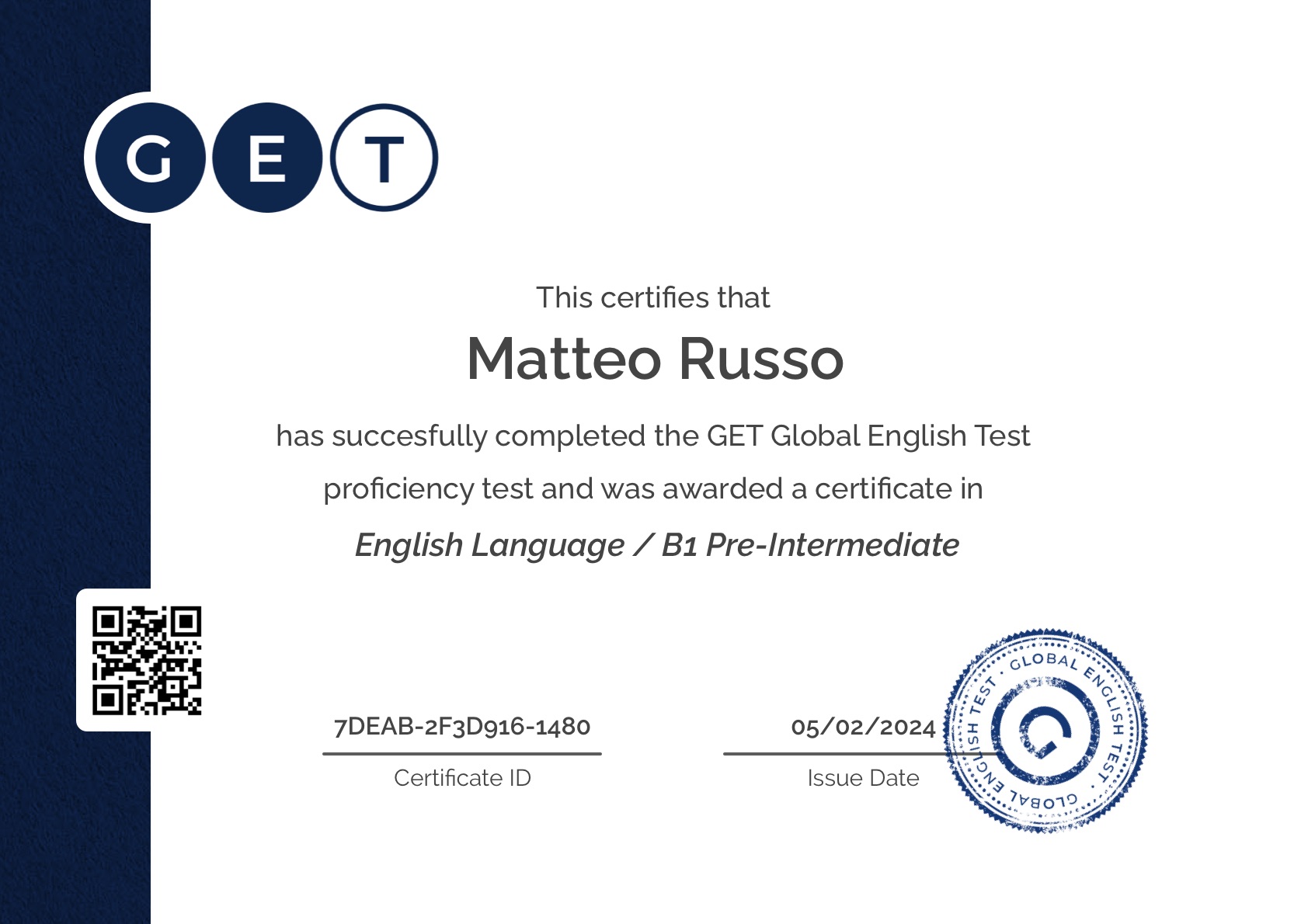
B1 English Level (Pre-Intermediate)
B1 EnglishLevel (Pre-Intermediate) has moderate understanding of English.
-
You can express preferences
-
You can discuss healthy habits and lifestyle choices
What is B1 English Level (Pre-Intermediate)?
The B1 English level, also known as “Pre-Intermediate,” is the third level in the Common European Framework of Reference for Languages (CEFR).

Key characteristics of the B1 English level (Pre-Intermediate):
Expanded Vocabulary
Individuals at the B1 level have a broader vocabulary compared to A2, including words and phrases related to a wider range of topics such as work, travel, health, leisure activities, and social situations.
More Complex Sentence Structures
They can construct more complex sentences using a variety of grammar structures, including past continuous, present perfect, future forms, and conditional sentences. However, their sentences may still contain errors and lack fluency.
Improved Reading Comprehension
They can understand longer and more complex written texts such as articles, short stories, and simple narratives on familiar topics. They can grasp main ideas, key details, and understand the writer’s opinion or intention.
Better Listening Comprehension
They can understand spoken language in a variety of contexts, including conversations, presentations, and interviews, as long as the speech is clear and relatively slow-paced. They can follow longer discussions and understand the main points.
Enhanced Speaking Skills
They can engage in more extended conversations and discussions on familiar topics, express opinions, provide explanations, and share experiences. They can participate in social interactions, negotiate, and express preferences and interests.
Improved Writing Skills
They can write coherent and connected texts on familiar topics, such as emails, letters, messages, and short essays. Their writing may still contain errors, but they can convey ideas clearly and effectively.
Test your English level now
Answer 40 questions and find out your English language level comfortably.

An A1 English Level Certificate. Start the test to get yours now!
Listen to a B1 English Level Speaker
Play the audio recording below to listen to an example of a conversation by someone speaking English at a B1 level.

What can B1 English Level Do?
At the B1 English level, also known as “Pre-Intermediate,” individuals have developed basic proficiency in English and are able to communicate effectively in a wider range of situations. Here are some key abilities and tasks that someone at the B1 level can typically accomplish:
Engage in Conversations
They can participate in conversations on familiar topics, express opinions, and engage in discussions with others. They can also ask and answer questions, provide explanations, and share personal experiences.
Understand Spoken English
They can understand the main ideas and key details in spoken English on familiar topics, such as everyday conversations, radio broadcasts, and simple presentations, provided the speech is clear and relatively slow-paced.
Read and Understand Simple Texts
They can read and understand straightforward texts such as articles, stories, and reports on familiar topics, as well as instructions, advertisements, and everyday correspondence.
Write Basic Texts
They can write simple texts such as emails, messages, letters, and short essays on familiar topics. They can convey information, express opinions, and provide explanations using basic vocabulary and sentence structures.
Express Preferences and Desires
They can express preferences, desires, likes, and dislikes using a wider range of vocabulary and more complex sentence structures compared to lower proficiency levels. They can also give reasons and explanations for their preferences.
Handle Routine Transactions
They can handle routine transactions in everyday situations, such as making travel arrangements, booking appointments, and ordering food in restaurants, using appropriate language and social conventions.
Use Basic Grammar and Vocabulary
They have a solid understanding of basic grammar and can use a variety of verb tenses (present simple, past simple, present continuous, future with “will”) and other grammatical structures accurately. They have a wider range of vocabulary and can express themselves using more varied and nuanced language.

What Can B1 English Level (Pre-Intermediate) Read?
At the B1 English level – Pre-Intermediate, individuals have developed basic reading skills and can understand a variety of texts on familiar topics. Here are some examples of the types of reading materials that someone at the B1 level can typically read:
Short Stories and Novels
They can read short stories, novellas, and simplified novels written for learners at the pre-intermediate level. These texts often contain straightforward language, clear plotlines, and manageable lengths.
Newspaper and Magazine Articles
They can read newspaper articles, magazine features, and online blogs on familiar topics such as news, lifestyle, entertainment, and current events. They can understand the main ideas, key details, and opinions presented in the texts.
Everyday Texts
They can read and understand everyday texts such as emails, letters, advertisements, product descriptions, and announcements. They can extract relevant information and understand the purpose and context of the texts.
Simple Instructions and Procedures
They can read and follow simple instructions and procedures for everyday tasks such as recipes, DIY projects, assembly guides, and operating manuals. They can understand the sequence of steps and follow directions accurately.
Travel Guides and Brochures
They can read travel guides, brochures, and tourist information on familiar destinations and attractions. They can understand information about places to visit, activities to do, and practical travel tips.
Educational and Academic Texts
They can read educational and academic texts such as textbooks, study guides, and instructional materials related to their areas of interest or study. They can understand the main concepts, key points, and supporting details presented in the texts.
Overall, individuals at the B1 English level have developed reading skills that allow them to understand a variety of texts on familiar topics. While they may still encounter some challenges with more complex or unfamiliar materials, they have a solid foundation that enables them to comprehend and engage with a wide range of written texts.
Test your English level now
Answer 40 questions and find out your English language level comfortably.

B1 English Level (Pre-Intermediate) Spaeaking Skills
At the B1 English level, also known as “Pre-Intermediate,” individuals have developed basic proficiency in English and can engage in conversations on a variety of topics. Here are some ways someone at the B1 level can talk:
Participate in Conversations
They can engage in conversations on familiar topics, express opinions, and share personal experiences. They can also ask questions, provide explanations, and engage in discussions with others.
Express Preferences and Desires
They can express preferences, desires, likes, and dislikes using a wider range of vocabulary and more complex sentence structures compared to lower proficiency levels. They can also give reasons and explanations for their preferences.
Discuss Past Experiences
They can talk about past experiences, events, and activities using past tenses such as the past simple and past continuous. They can describe what they did, where they went, and who they were with.
Talk about Future Plans
They can discuss future plans, intentions, and possibilities using future tenses such as “will” and “going to.” They can talk about what they want to do, where they want to go, and what they hope to achieve.
Engage in Social Interactions
They can engage in social interactions such as greetings, introductions, and small talk. They can also initiate and maintain conversations with others, ask questions about their interests and activities, and respond appropriately to social cues.
Give Opinions and Explanations
They can express opinions, give reasons, and provide explanations on a variety of topics. They can state their opinions clearly, support them with relevant information or examples, and engage in respectful debates or discussions with others.

How can I improve B1 English level (Pre-Intermediate) language skills?
The B1 English level, commonly referred to as “Pre-Intermediate,” represents a stage in language proficiency where individuals have developed beyond basic or elementary proficiency but are not yet considered intermediate-level speakers. Here are some key characteristics of the B1 English level:
- Expand Vocabulary: Focus on learning new words and phrases relevant to daily life, work, and study. Use flashcards, vocabulary lists, and language learning apps to practice and memorize new vocabulary regularly.
- Practice Listening: Listen to a variety of English materials, such as podcasts, radio programs, and online videos. Try to understand the main ideas, key details, and the speaker’s tone and attitude. Repeat listening activities to improve comprehension.
- Speak Regularly: Engage in conversations with native speakers or language partners. Practice speaking about familiar topics, expressing opinions, and asking questions. Join language exchange groups or online conversation clubs to practice speaking skills in a supportive environment.
- Read Extensively: Read a wide range of English texts, including newspapers, magazines, novels, and online articles. Focus on understanding the main ideas, identifying key information, and guessing the meanings of unfamiliar words from context.
- Write Regularly: Practice writing in English by keeping a journal, writing emails, or participating in online forums. Pay attention to grammar, punctuation, and sentence structure. .
- Grammar and Syntax: Review and practice grammar rules and sentence structures commonly used at the B1 level, such as verb tenses (present, past, future), modal verbs (can, could, will, would), and conditional sentences (if clauses).
- Use Language Learning Resources: Utilize textbooks, online courses, language learning apps, and other resources specifically designed for learners at the B1 level. Follow structured lesson plans and complete exercises to reinforce language skills systematically.
- Seek Feedback: Ask for feedback from teachers, language tutors, or language exchange partners to identify areas for improvement. Focus on addressing weaknesses and practicing specific language skills through targeted exercises and activities.
- Set Goals: Establish clear language learning goals and track progress regularly.
- Immerse Yourself: Surround yourself with English language materials. Watch English movies and TV shows, listen to English music, and engage with English-speaking communities.
What are B1 English Level (Pre-Intermediate) Daily Idioms?
At the B1 English level, individuals may encounter a variety of idiomatic expressions in everyday conversations. These idioms add color and nuance to language, helping speakers express themselves more fluently. Here are some examples of daily idioms suitable for B1 English level:
B1 English Level Idioms List with Examples
-
- Get cold feet: To feel nervous or anxious about something, especially before doing something important.
Example: “I was going to ask her out on a date, but I got cold feet at the last minute.” - Hit the nail on the head: To describe someone who is exactly right about something or has accurately identified the main point.
Example: “You hit the nail on the head with your analysis of the situation.” - Cost an arm and a leg: Used to describe something that is very expensive. Example: “I wanted to buy that new phone, but it costs an arm and a leg.”
- Bite the bullet: To face a difficult or unpleasant situation with courage and determination.
Example: “I know the exam will be tough, but we just have to bite the bullet and do our best.” - A piece of cake: Used to describe something that is very easy to do. Example: “Don’t worry, passing the test will be a piece of cake!”
- Burn the midnight oil: To work late into the night or put in extra effort to complete a task.
Example: “I have a deadline tomorrow, so I’ll have to burn the midnight oil tonight.” - Break the ice: To initiate conversation or friendship in a social situation. Example: “I tried to break the ice with my new colleagues by asking about their weekend plans.”
- Get cold feet: To feel nervous or anxious about something, especially before doing something important.
Test your English level now
Answer 40 questions and find out your English language level comfortably.
How many words should you know for B1 Level English (Pre-Intermediate)?
For the B1 Level English, also known as “Pre-Intermediate,” individuals should typically aim to have a vocabulary of approximately 1,500 to 2,500 words. This vocabulary range allows them to communicate effectively in a variety of everyday situations and handle a range of topics with relative ease.
At the B1 level, learners should focus on expanding their vocabulary beyond basic everyday words to include more specific and nuanced terms related to a variety of topics such as work, leisure activities, hobbies, travel, and social interactions. Additionally, learners should aim to acquire vocabulary related to more complex grammatical structures and expressions used in conversations, reading, writing, and listening at the pre-intermediate level.

B1 English Level (Pre-Intermediate) Word List
- Common Vocabulary:
- Greetings: Hello, Hi, Hey, Good morning, Good afternoon, Good evening.
- Personal Information: Name, Age, Address, Phone number, Email, Nationality.
- Family: Mother, Father, Brother, Sister, Son, Daughter, Husband, Wife.
- Food and Drink: Apple, Bread, Cheese, Coffee, Tea, Juice,
- Places: Home, School, Office, Park, Restaurant, Supermarket, Street, Avenue.
- Transportation: Car, Bus, Train, Bicycle, Taxi, Plane, Ticket, Station.
- Weather: Sunny, Cloudy, Rainy, Windy,
- Health: Headache, Fever, Cough, Sore throat,
- Basic Verbs:
- Regular verbs: Go, Eat, Drink, Sleep, Work, Play,
- Irregular verbs: Have, Be, Do, See, Take, Get,
- Present simple: I work, He eats, She sleeps, We play.
- Past simple: I went, He ate, She slept, We played.
- Future simple: I will go, He will eat, She will sleep, We will play.
- Adjectives and Adverbs:
- Adjectives: Big, Small, Tall, Short, Old, Young, Happy, Sad,
- Adverbs: Quickly, Slowly, Carefully, Happily, Sadly
- Prepositions and Conjunctions:
- Prepositions: In, On, At, Under, Behind, Next to, Near, Far, Across from.
- Conjunctions: And, But, Or, So, Because, Although, When, If.
- Question Words:
- Who, What, Where, When, Why, How, How much, How many, Which.
- Phrasal Verbs:
- Look up, Turn on, Turn off, Take off, Put on, Get up, Go out, Come back.
- Common Idioms and Expressions:
- Break the ice, Hit the hay, Cost an arm and a leg, Under the weather, Piece of cake.
- Functional Language:
- Making requests: Can you help me? Could you pass the salt, please?
- Asking for information: Where is the nearest bank?
- Giving instructions: Turn left at the traffic light. Take two tablets twice a day.
- Expressing opinions: I think it’s a good idea. In my opinion, it’s too expensive.
- Making suggestions: Why don’t we go to the movies? Let’s have dinner together.
- Basic Grammar Structures:
- Subject-Verb Agreement: She works, They play, He eats.
- Present Continuous: I am eating, She is reading, They are sleeping.
- Past Continuous: I was working, She was cooking, They were studying.
- Future Continuous: I will be sleeping, She will be reading, They will be traveling.
- High-Frequency Words:
- Words that frequently appear in various contexts: Good, Bad, Nice, Great, Important, Interesting, Fun, Difficult, Easy, Beautiful.
English Test Questions and Answers for B1 English Level (Pre-Intermediate)
Short B1 English Level (Pre-Intermediate) Test and Answers
Grammer: Choose the correct form of the verb to complete the sentence:
- “She ____________ to the store every Saturday.”
a) go
b) goes
c) going
d) went
Vocabulary: Choose the correct word to complete the sentence:
2. “I need to ____________ some groceries from the supermarket.”
a) buy
b) by
c) bye
d) bi
Reading Comprehension: Read the following paragraph and answer the question:
“Yesterday, Sarah went to the beach with her friends. They swam in the ocean and played beach volleyball. Later, they had a picnic and watched the sunset.”
3. What did Sarah do at the beach with her friends?
a) Went shopping
b) Played beach volleyball
c) Watched a movie
d) Went for a walk
Answers: 1-b , 2-a, 3-b
What Jobs Can CEFR B1 English Speakers Do?
As a B1 English speaker, you have reached the intermediate level of the Common European Framework of Reference (CEFR), meaning you can handle a wide range of conversations and tasks in English. At this level, you can communicate effectively in everyday situations and handle more complex tasks, making you eligible for a variety of jobs across multiple industries.
In this part, we’ll explore the best job opportunities for CEFR B1 English speakers and provide tips for advancing your career with intermediate English skills.
Jobs Suitable for CEFR B1 English Speakers
1. Administrative Assistant
As a B1 English speaker, you can manage more detailed tasks in an administrative role. This includes handling emails, answering phone calls, scheduling appointments, and supporting daily office operations. Your ability to write clear, structured emails and hold phone conversations makes you a valuable asset in office environments.
2. Customer Support Representative
Many companies hire customer support agents with B1-level English. In this role, you’ll help resolve customer issues via phone, email, or chat. Since B1 speakers can understand customer concerns and provide appropriate responses, this job offers plenty of opportunities to practice both written and spoken English.
3. Sales Representative
Sales roles are ideal for B1 English speakers as they involve engaging with customers, explaining products or services, and negotiating deals. Whether in a retail setting or a business-to-business (B2B) environment, your intermediate English level enables you to persuade customers and close sales.
4. Hospitality Staff
In the hospitality industry, B1 English speakers are qualified for roles like hotel receptionist, tour guide, or restaurant supervisor. These jobs require regular interaction with international clients and guests, making your English communication skills highly valuable for ensuring customer satisfaction.
5. Teaching Assistant
If you have an interest in education, you can work as a teaching assistant in an English-speaking environment. B1-level English allows you to support teachers, help students with their language learning, and engage in classroom discussions. This is a great way to improve your language skills while gaining experience in education.
6. Marketing Assistant
In roles like marketing assistant, B1 English speakers can contribute to social media management, content creation, and customer outreach. Your ability to understand and write in English will be crucial for tasks such as writing social media posts, blog content, or promotional emails.
Examples of Industries Hiring B1 English Speakers
1. Customer Service and Call Centers
Companies with customer service departments or call centers often look for B1-level English speakers to handle basic customer inquiries, complaints, or requests. Your intermediate English skills will help you respond appropriately and resolve issues efficiently.
2. Hospitality and Tourism
The tourism industry offers various roles for B1 English speakers, such as tour guides, travel agents, or hotel front desk staff. These jobs require you to engage with English-speaking tourists or clients, assist them with bookings, and provide recommendations.
3. Sales and Retail
Sales associates, retail assistants, and sales representatives frequently use English to communicate with customers and process sales. Your ability to explain products, offer suggestions, and handle transactions in English will make you an asset in this sector.
4. Administrative and Office Roles
Many companies require administrative staff with intermediate English proficiency to assist with managing office tasks, communication, and coordination. Your ability to handle emails, write reports, and support meetings in English will be critical to your success in this role.
5. Marketing and Social Media
The marketing industry is another field where B1 English speakers can thrive. Jobs in content writing, social media management, or digital marketing require a good command of written and spoken English to create engaging posts, ads, and campaigns.
As a CEFR B1 English speaker, you are equipped to take on jobs that require intermediate communication skills. Whether you’re interested in customer service, sales, marketing, hospitality, or office administration, your ability to speak, write, and understand English will open many doors.
To advance your career, focus on improving your English skills, expanding your professional vocabulary, and practicing communication in workplace settings. With ongoing language development, you’ll be well on your way to more advanced roles and career opportunities.

Test your English level and get your certificate!
Find out your English level
Takes only ~20 minutes 🎉
